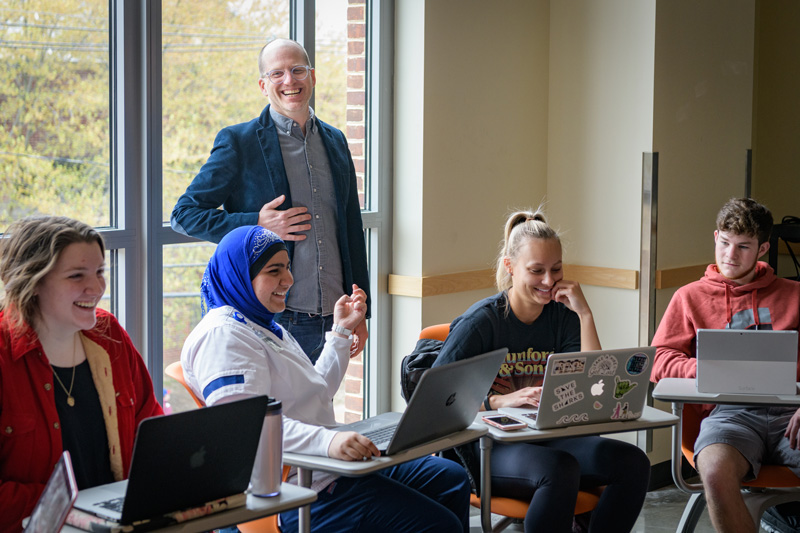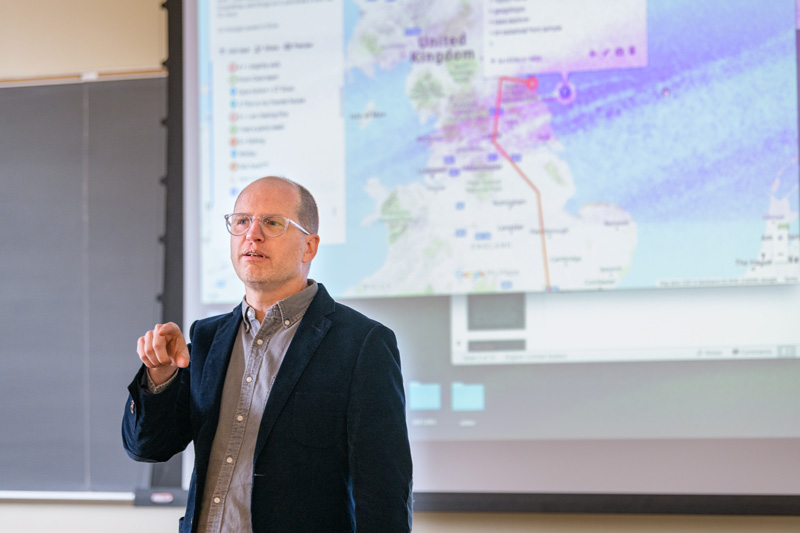


Contagion versus care
Photos by Evan Krape June 10, 2019
UD’s Paul Jackson uses collective storytelling to engage cultural geography students
Half of Paul Jackson’s Cultural Geography class has placed him on a fictitious boat in North Moors National Park in the United Kingdom. With a roll of the dice, Jackson’s fate will either be to remain healthy or to be infected with an as of yet undetermined disease.
One of the class members stands up and rolls the dice. The outcome for Jackson is not good: the student rolled a 10 and after conferring with his classmates, they decided that Jackson’s alcoholic character is experiencing liver failure.
Now, it’s up to the other half of the class to save him. With a roll of the dice, the opposing team gets a 15 and debates on how exactly to help him. They Google the best hospitals in the United States and decide to send him to the Mayo Clinic in Minnesota.
This exercise is all part of Jackson’s plan to teach the students about cultural geography, a sub-field of human geography that sees cultures and societies as developing out of their local landscapes but also shaping those landscapes.
Jackson’s class looks at health challenges in different locations in the world, examining how different societies think about infection and illness. For instance, if Jackson’s character gets a disease or an illness in Croatia, the class examined how the medical care he would find in that community differed than if he were to get sick in his hometown of Philadelphia. They also teased out how his support network differs in both locations — with his character being relatively isolated in Croatia but surrounded by a support group of family back home.
This all takes place amidst the backdrop of the game, with the students participating in a group activity to enhance their collective storytelling abilities.
“The concept is to shake them up out of their standard learning environment and to make them active participants in trying to problem-solve a health issue,” said Jackson, assistant professor in the Department of Geography in UD’s College of Earth, Ocean and Environment. “I use myself as the guinea pig in that way.”
The class is divided up into two teams: a care team and a contagion team.
They roll a 20-sided Dungeons and Dragons dice to allow for randomness. When the students proposed giving Jackson’s character liver failure, they rolled against him and had to get a higher number than what he rolled.

The context is important as well. Jackson’s class has made him a professor and a geologist who enjoys exploring caves, which is why he started his journey in Croatia, where the contagion class put him in a cave to try to deprive him of water. The care team transported him away from the cave in Croatia to London, reasoning that he had to travel to the World Congress on Geology and Earth Science where he was a key presenter.
From London, he took a trip to Moors National Park as the contagion team tried to isolate him and then eventually ended up at the Mayo Clinic in Minnesota.
“Even just saying to them, ‘Ok, you want to put me in the best facilities in the United States,’ that allows me to prompt them and ask: ‘Where is that?’ ” Jackson said. “This teaches them to be part of a group. It’s a collective research project that looks at what can hurt me, what can save me and how do you determine that? It forces them to come to a decision, which forces them to have a discussion.”
Because the class in the spring of 2019 had several first-year students, Jackson also said that it helps them to learn and improve upon basic research skills. He tries to make the class as realistic as possible — though admitting that there is also a good amount of creative license, such as airlifting a sick patient from the United Kingdom all the way to Minnesota.
“They can’t just make me spontaneously combust or anything like that,” said Jackson. “My ultimate goal is for them to think about the social community. There’s got to be people who are supporting me and that generally isn’t health care professionals.”
Jackson starts off the semester at 100 health points and then dwindles down or stays healthy as the class progresses. He is still tinkering with the rules and has discovered some pitfalls occur when each group somehow manages to roll a one or a 20, which is like hitting the jackpot.
In addition to playing the game every Wednesday, Jackson’s class also read Pandemic: Tracking contagions, from Cholera to Ebola and beyond, by Sonia Shah and had a lecture with Jackson every Monday. Friday was reserved for teaching the students basic cultural analysis, where they learn how cultures deal differently with topics such as quarantines, dirty places and climate.
By having the students read about how cultures react to diseases differently, Jackson is hoping they learn how diseases are spread or suppressed through different cultures in different areas of the globe.
Jackson is hoping to instill a bit of game theory into his students as well as they think not only about his class, but also about life.
“There’s a thing called finite versus infinite games,” Jackson said. “You can think of this class as a finite game. You can win at this game and get a good grade, but education is the infinite game. It will never end. I try to say, we’re playing this game, but really, I want you to be more curious about the world.”
Contact Us
Have a UDaily story idea?
Contact us at ocm@udel.edu
Members of the press
Contact us at mediarelations@udel.edu or visit the Media Relations website

